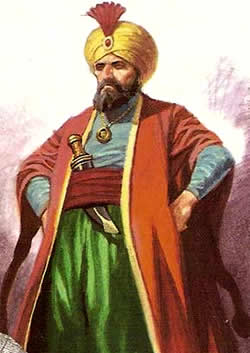 |
| Harun Al-Rashid - Abbasid Caliph |
He ruled at the zenith of Abbasid power and wealth. The Abbasid capital, Baghdad, with 1 million inhabitants, was a center for learning, the arts, and conspicuous consumption. A keen patron of the arts, especially poetry, al-Rashid maintained a lavish court with vast palaces and gardens adorned with jewel-encrusted tapestries and fountains.
The lavish lifestyle of the royal court was popularized in the long series of fanciful tales in The Thousand and One Nights, known in the West as the Arabian Nights. Although his court enjoyed poetry, music, and sumptuous feasts, Harun al-Rashid was a practicing Muslim who made the pilgrimage to Mecca accompanied with a large entourage.
According to legend, he also went out on the streets of Baghdad in various disguises to talk with his subjects and learn their opinions and reactions to the government. His mother, Khaizuran, who had been a Yemeni slave, exerted considerable influence in the political life of the court and was a rich landowner in her own right. His favorite wife, Zubaidah, dominated palace life, holding enormous parties and celebrations.
Harun al-Rashid also received ambassadors from the Holy Roman Empire and China and showered them with exotic and expensive gifts. But amid the luxury there were signs of economic decline, as agricultural productivity in Iraq slowed and the farming out of tax collecting to private individuals led to corruption and inefficiency.
As caliph, Harun al-Rashid put down rebellions in northern Iran and Syria and led his forces deep into Anatolia in 791 c.e. where he demanded and received huge monetary tributes from the Byzantine Empire. When these payments ceased in 802 c.e. Harun al-Rashid quickly moved against the Byzantine emperor, defeating him on several occasions. These conflicts increased the religious enmity between these two great empires.
 |
| Tribute of Caliph Harun Al Rashid to Charlemagne |
In 789 c.e. after a palace scandal, Harun al-Rashid imprisoned and killed key members of the important Barmakid family. Of Persian origin, the Barmakids had often acted as extremely able viziers (ministers) for the Abbasid rulers. Over his North African territories (present-day Tunisia and Algeria) al-Rashid appointed Ibrahim ibn al-Aghlab as governor in 800 c.e.
He went on to establish the Aghlabid dynasty, ruling until 909 c.e. when the Fatimid dynasty based in Egypt replaced it. Harun al-Rashid died on military maneuvers to quell a rebellion in northern Iran in 809 c.e. After his death his sons immediately began to fight over power and territory, thereby marking the beginning of the decline and disintegration of the Abbasid empire.